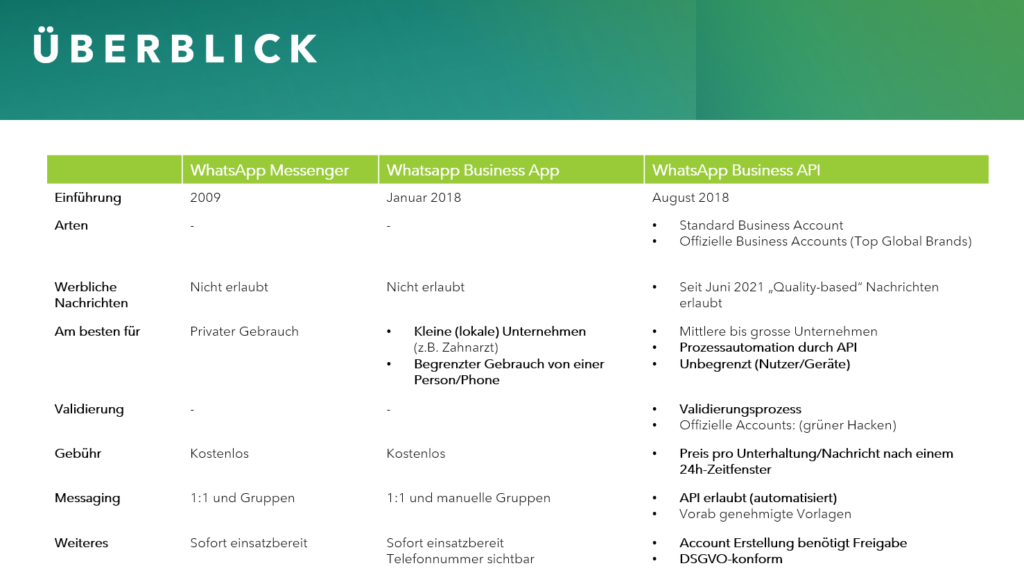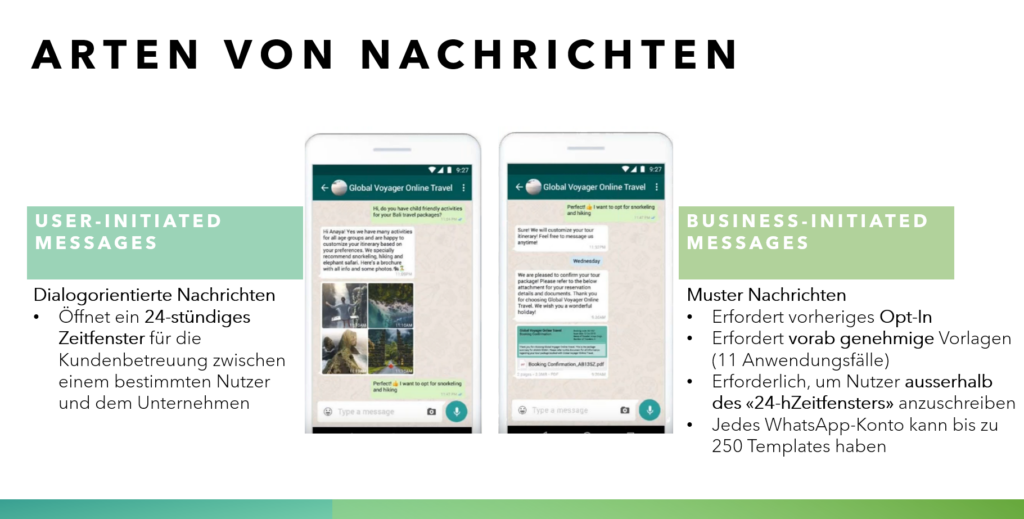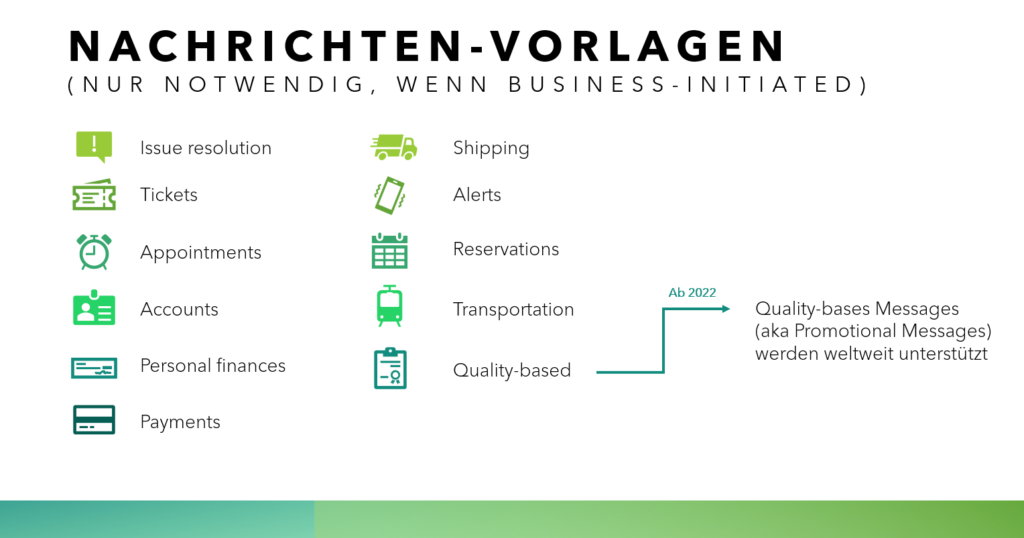What you should know and how you can use it:
Chatting via WhatsApp is becoming increasingly popular, even with companies. A quick chat and the vacations are booked, the subscription is changed and the notice about the package comes conveniently via WhatsApp. Around 175 million messages are sent to a WhatsApp Business account every day (as of 2021).
But what is WhatsApp Business and what are the differences to WhatsApp Business API?:
WhatsApp currently offers two business versions for companies. The “WhatsApp Business App” is intended for smaller companies as a means of communication, as it comes with limited deployment options. This includes, for example, answering customer queries manually. But this is not a variant which can be used in customer service, for example. This variant also has to be considered rather problematic with regard to the DSGVO regulation.
For larger companies, Facebook launched the “WhatsApp Business API” in August 2018. Using technical interfaces, companies can answer and automate WhatsApp messages from customers here – in compliance with DSGVO.
The differences between the various business versions:
WhatsApp Business App
- Small business
- Immediately available via WhatsApp
- Manual response to customer inquiries
- No possibility to apply for “official business account”
- Limited use (users/devices)
WhatsApp Business API
- Medium to large companies
- Requires programming knowledge
- Service offer via official Facebook partners
- Automations and dispatch in larger quantities possible
- Application for “official business account” possible
- Unlimited use (users, devices) incl. connection to CRM systems
A few important points must be considered for the use. For example, the company must be verified and have an opt-in process. Depending on the opt-in, conversations are only valid in a 24-hour time window and automated message templates must be approved in advance. But what does that mean exactly? We have taken a closer look at WhatsApp’s requirements and summarized them.

Account verification:
After registration, the company is listed as a business account. For companies that belong to an “authentic brand”, WhatsApp offers “official business accounts”. These accounts are verified by WhatsApp and receive a green tick in the profile. But analogous to Instagram (verification through blue checkmark), the company has to fulfill certain requirements in order to apply for an official business account. Currently, verification is only reserved for well-known brands and large companies.
The opt-in and opt-out process:
WhatsApp basically differentiates between two types of messages, to what extent customers may – or may not – be contacted.
- User-initiated messages:
Here, companies offer their customers the opportunity to start a joint chat/conversation via WhatsApp. The conversation is initiated by the customer. The company has a 24-hour window to respond to the conversation. - Business-initiated messages:
Here, the company has received an opt-in from the customer in advance, which entitles companies to write to customers via WhatsApp. This gives the company permission to write to its customers via WhatsApp in predefined cases.
Furthermore, companies are obliged to offer customers an opt-out option. This can be done, for example, by webhooks (information that triggers an event) or by a keyword placed in the chat (e.g., “Stop”). It is recommended to place such hints directly at the beginning of a chat.

The response time window:
With user-initiated messages, the company has a 24h time window to respond to the message from the customer. Mobile messages in particular are intended to enable users to make direct contact. Due to the limited response time window, companies are required to process requests accordingly quickly. Automations using chatbots are also permitted here. If the time window has expired, permission must be obtained from the customer again.
With business-initiated messages, the company has permission to contact customers outside the 24-hour time window.
The message templates:
The business-initiated messages are subject to strict templates and play a big role especially with the “WhatsApp Business API”. In addition to prefabricated templates from WhatsApp, users can also create their own. However, these must be approved by WhatsApp in advance.
With the message templates, companies can send suitable responses directly (e.g. order confirmation, notifications or alerts). By checking the templates, WhatsApp ensures that companies do not send any unwanted content (e.g. spam, advertising campaigns, etc.).
WhatsApp has defined 11 use cases whereby customers may be contacted by the company. From June 2022, WhatsApp will release “quality-bases messages”. Messages that represent an “added promotional value” for customers may also be delivered. However, WhatsApp reserves the right to block accounts that violate the guidelines, as they do not want to lose their market position as a trusted messenger through “spam messaging”.
.

Security, costs and implementation – this is what you need to know:
Especially in customer communication, data protectionIt is not enough for companies to aggregate your users' data. They must also obtain permission to use this data at the same time. They must obtain an overview of whether and for what purpose they may actively use this personal data or use it for advertising... is a big issue and often not blessed by legal compliance. The good thing about the “WhatsApp Business API”, it allows companies to use it in a DSGVO-compliant manner, and messages are encrypted end-to-end. Unlike the other variants, however, it is not free. In addition to the license, there are costs per conversation and, depending on the provider, further fees for WhatsApp API access and setup costs. WhatsApp only grants direct API access to a few, reputable companies. All other companies must choose the path via an official Facebook partner, which can unlock access to the API.
When is it worth integrating “WhatsApp Business” in marketing?:
The direct, fast and personal communication clearly promotes customer loyalty. Customers often receive a response from the company within a few minutes. Real-time communication can also help to inform customers more quickly about status messages. WhatsApp is also helpful in the service area, especially with regard to FAQs.
Brief overview:
As a means of communication for direct customer inquiries or notifications, it certainly makes sense to use WhatsApp. Likewise, WhatsApp will also allow “Quality Based Messaging” (aka Promotional Messaging) from 2022. For example, customer feedback could be picked up directly via WhatsApp after a purchase, or the customer could be reminded of their purchase when their shopping cart is full. Of course, it is also possible to provide the customer with certain follow-up campaigns and product suggestions as part of the regulations. However, the corresponding message templates must be approved by Facebook. However, the opt-in from the customer is and remains important here as well.
Good to know:
- Business account is created quickly and easily
- WhatsApp is not a platform for spam and advertising campaigns
- Access to API only possible via service provider
- Individual templates must be verified by Facebook
- Opt-in and opt-out requirements must be observed
- Open rate is very high, especially in the messaging area
- Costs for license, transaction costs and initial setup fee by service provider

